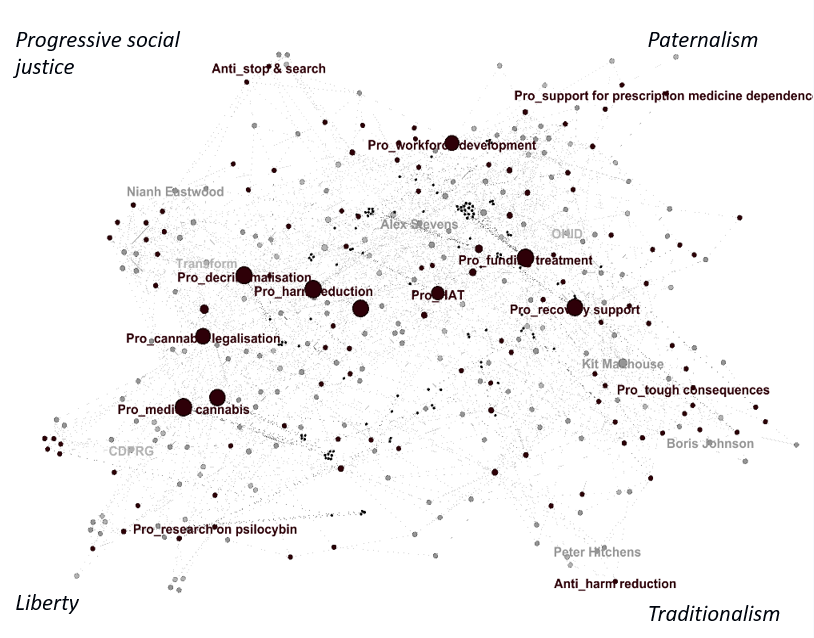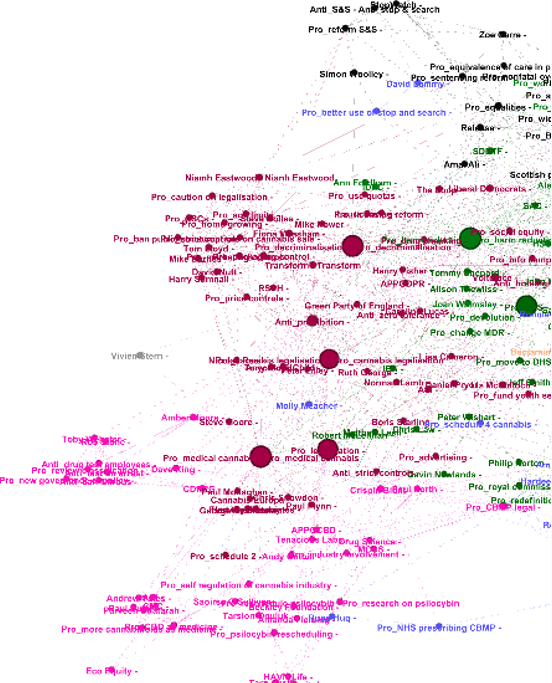
Next week, at the #ISSDP2022 conference, I will present the first paper in preparation for my book with @policypress on ‘Drug Policy Constellations’. It examines the role of morality in influencing UK drug policy. kar.kent.ac.uk/97946/ Here’s a summary. 1/11 

TL:DR. The contents of drug policy decisions are influenced by the different moralities which bring people together in constellations of policy actors and policy positions. 2/11
The paper uses the policy constellations approach, which I created with @GFZampini in our earlier article on UK drug policy. It explains that networks bring not just people but power and moral ideas together in overlapping constellations. linkinghub.elsevier.com/retrieve/pii/S… 3/11
Using auto-ethnography, plus critical realist discourse analysis of policy documents and elite interview transcripts, I identified five ethico-political bases of UK drug policy. #criticalrealism 4/11 

I then mapped the UK drug policy field, using two-mode social network analysis. This uses the connections between policy actors and the policy positions they hold to map them into connected clusters. #SNA 5/11 

[This is one of my first forays into #SNA, so I’d be particularly interested in feedback on this aspect of the paper.] 6/11
The distribution of actors and positions across the sociogram maps onto the four ethico-political bases of traditionalism, paternalism, progressive social justice, and liberty. Compassion is a shared value across the policy field. 7/11 

Using the modularity statistic in @Gephi, I identified three macro constellations in UK drug policy. The most powerful policy actors cluster together in the hybrid medico-penal constellation, in which paternalism overlaps with the use of drug policy for social control. 8/11 

The UK drug policy reform movement can be grouped into three, overlapping micro constellations which focus on: racial justice; progressive reform; and individual and commercial freedom. 9/11 

The ethico-political bases I have identified explain the shape of the UK drug policy field better than do party political affiliations. Labour (red) and Conservative (blue) policy actors can be found across the drug policy spectrum. 10/11 

These ethico-political bases, I argue, help us understand the role of morality in UK drug policy, and why it takes the forms it does. You can download the paper (pdf) and the presentation (ppt). kar.kent.ac.uk/97946/ Comments and questions are very welcome. 11/11
With thanks to interviewees, and people with whom I've discussed these ideas, including @DameCarolBlack @MatSouthwell @SteveTransform @KeithNHumphreys @Paul__North @cjsnowdon @CrispinBlunt @DanielPryorr @matthewlesh @OliverStanding and many others.
If you're interested in the role of morality in drug policy (and, indeed, any aspect of drug policy), I highly recommend this brilliant book by @AlisonRitter1 taylorfrancis.com/books/mono/10.…
And if you're interested in critical analysis of policy processes, have a look at the fascinating work of @CairneyPaul, e.g. link.springer.com/book/10.1057/9…
• • •
Missing some Tweet in this thread? You can try to
force a refresh







